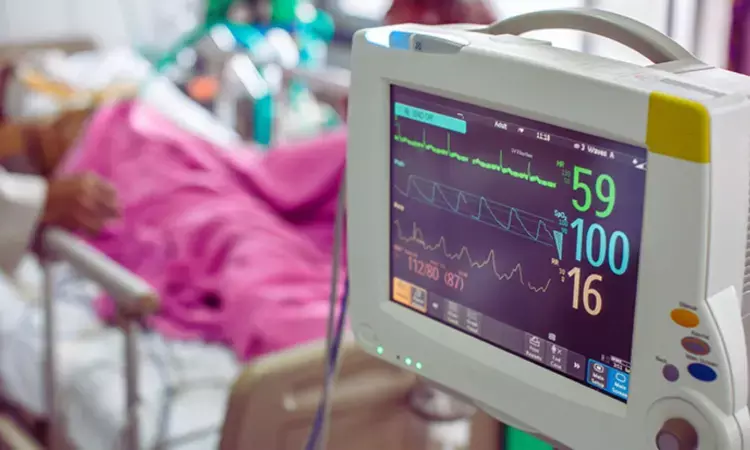- Home
- Medical news & Guidelines
- Anesthesiology
- Cardiology and CTVS
- Critical Care
- Dentistry
- Dermatology
- Diabetes and Endocrinology
- ENT
- Gastroenterology
- Medicine
- Nephrology
- Neurology
- Obstretics-Gynaecology
- Oncology
- Ophthalmology
- Orthopaedics
- Pediatrics-Neonatology
- Psychiatry
- Pulmonology
- Radiology
- Surgery
- Urology
- Laboratory Medicine
- Diet
- Nursing
- Paramedical
- Physiotherapy
- Health news
- Fact Check
- Bone Health Fact Check
- Brain Health Fact Check
- Cancer Related Fact Check
- Child Care Fact Check
- Dental and oral health fact check
- Diabetes and metabolic health fact check
- Diet and Nutrition Fact Check
- Eye and ENT Care Fact Check
- Fitness fact check
- Gut health fact check
- Heart health fact check
- Kidney health fact check
- Medical education fact check
- Men's health fact check
- Respiratory fact check
- Skin and hair care fact check
- Vaccine and Immunization fact check
- Women's health fact check
- AYUSH
- State News
- Andaman and Nicobar Islands
- Andhra Pradesh
- Arunachal Pradesh
- Assam
- Bihar
- Chandigarh
- Chattisgarh
- Dadra and Nagar Haveli
- Daman and Diu
- Delhi
- Goa
- Gujarat
- Haryana
- Himachal Pradesh
- Jammu & Kashmir
- Jharkhand
- Karnataka
- Kerala
- Ladakh
- Lakshadweep
- Madhya Pradesh
- Maharashtra
- Manipur
- Meghalaya
- Mizoram
- Nagaland
- Odisha
- Puducherry
- Punjab
- Rajasthan
- Sikkim
- Tamil Nadu
- Telangana
- Tripura
- Uttar Pradesh
- Uttrakhand
- West Bengal
- Medical Education
- Industry
Pulmonary Rehabilitation Improves Respiratory Function in Ventilated Patients: Meta-Analysis Reveals

China: A new meta-analysis published in BMC Pulmonary Medicine found that pulmonary rehabilitation in mechanically ventilated patients resulted in significant improvements in maximum inspiratory pressure, maximum expiratory pressure, and tidal volume, and a reduction in the rapid shallow breathing index. Inspiratory muscle training was identified as the most effective intervention, followed closely by neuromuscular electrical stimulation.
The authors note that mechanical ventilation (MV) is a vital therapy for ICU patients. However, prolonged use can lead to complications like pulmonary atelectasis and ventilator-associated pneumonia, which impair respiratory function. Pulmonary rehabilitation (PR) has been shown to strengthen muscles and reduce pulmonary symptoms, mitigating MV’s adverse effects. Despite increasing evidence of PR’s efficacy, inconsistencies in interventions and indicators and a lack of multidisciplinary cooperation make determining the optimal PR protocol challenging.
Against the above background, Cheng Shouzhen, The First Affiliated Hospital of Sun Yat-Sen University, Guangdong, China, and colleagues aimed to explore the effects of various pulmonary rehabilitation interventions on respiratory function in mechanically ventilated patients and identify the most effective type of intervention through systematic review and meta-analysis.
For this purpose, the researchers searched PubMed, Embase, Web of Science, the Joanna Briggs Institute (JBI), and the Cochrane Library, covering studies from their inception until September 16th, 2024. The search focused on randomized controlled trials (RCTs) comparing pulmonary rehabilitation with usual care to improve respiratory function in mechanically ventilated patients. A meta-analysis was performed using Endnote X9 and R 4.3.1.
The following were the key findings:
Twelve articles were included in the systematic review, with ten analyzed in the meta-analysis.
The primary outcomes analyzed were:
• Maximum inspiratory pressure (MIP): 10 studies, 216 (intervention) versus 218 (control), MD = 7.45.
• Maximum expiratory pressure (MEP): 5 studies, 115 (intervention) versus 112 (control), MD = 13.98.
• Rapid shallow breathing index (RSBI): 4 studies, 96 (intervention) versus 98 (control), MD = -33.85.
• Tidal volume (VT): 4 studies, 96 (intervention) vs. 98 (control), MD = 74.64.
• MIP, MEP, and VT showed significant improvement after pulmonary rehabilitation.
• Random-effect models were used due to moderate heterogeneity.
The meta-analysis compared various pulmonary rehabilitation methods in mechanically ventilated patients, focusing on outcomes like MIP, MEP, RSBI, VT, RR, DM, and DT. Different methods offer distinct benefits, with inspiratory muscle training being the most recommended, followed by neuromuscular electrical stimulation. Based on clinical resources and patient tolerance, mechanical ventilation duration should be at least 24 hours.
"The findings provide valuable insights for designing pulmonary rehabilitation interventions in clinical settings," the researchers concluded.
Reference:
Xingyu, X., Dandan, Z. & Shouzhen, C. Effects of pulmonary rehabilitation on respiratory function in mechanically ventilated patients: a systematic review and meta-analysis. BMC Pulm Med 25, 4 (2025). https://doi.org/10.1186/s12890-024-03461-4
Dr Kamal Kant Kohli-MBBS, DTCD- a chest specialist with more than 30 years of practice and a flair for writing clinical articles, Dr Kamal Kant Kohli joined Medical Dialogues as a Chief Editor of Medical News. Besides writing articles, as an editor, he proofreads and verifies all the medical content published on Medical Dialogues including those coming from journals, studies,medical conferences,guidelines etc. Email: drkohli@medicaldialogues.in. Contact no. 011-43720751


